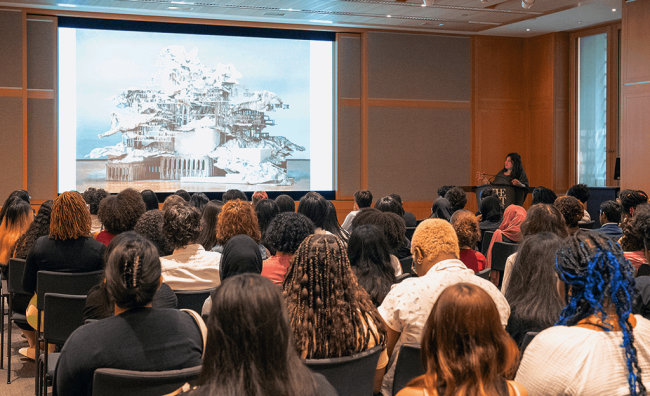You have /5 articles left.
Sign up for a free account or log in.

Each summer, Bloomberg Philanthropies arranges internships for rising high school seniors to participate in paid arts-focused experiential learning. In 2023, eighty seniors from New York City public high schools participated in internships, and during the kickoff event, visited the Metropolitan Museum of Art and learn from artists.
Studio Institute
This year, the Bloomberg Arts Internship (BAI) program will expand to offer opportunities for students as they enter college, allowing students to continue to hone their skills.
The program expansion will extend the program’s reach and continue to offer professional development support and guidance for rising talent interested in the arts and the business of the arts.
The background: BAI launched in 2012 by Bloomberg Philanthropies to provide high school students with paid work experience at cultural institutions, introduce students to career opportunities in cultural institutions and provide college preparation to high schoolers.
The program partners with organizations in Baltimore, Boston, New York City, Philadelphia and Washington, D.C. and will add locations in Detroit and New Orleans this summer, with anywhere from 25 to 100 interns in each city.
Internship hosts include the New York Botanical Garden, the New Orleans Film Society, the Baltimore Museum of Art, Drexel University’s Antoinette Westphal College of Media Arts and Design and Michigan State University’s Community School of Music Detroit.
The program: Upon entry, students must be a rising senior at a public high school in the U.S. Participants are identified by their school districts, teachers, youth employment programs and other nonprofits that work with high schoolers. From there, BAI manages all aspects of the program, coordinating to recruit potential interns, securing worksite placements at organizations, paying the student and the host organization and providing mentorship, workshops and field trips for participants.
The Power of Paid Internships
Research from the National Association of Colleges and Employers found students who participated in paid internship experiences during college received, on average, more job offers than their peers who had unpaid internships or no experience.
White students are more likely to hold internship experience, in general, and one in four first-generation students took an unpaid internship role.
The paid internships last seven weeks throughout the summer for a living wage based on their city’s market, says Kate Levin, principal at Bloomberg Associates in Cultural Assets Management and head of the Bloomberg Philanthropies Arts program. Students’ roles vary depending on their host company, including working in web development, grant writing or an education program.
Participants receive work-readiness and college-preparation training each week in a classroom workshop, which provides them a portfolio of work including a cover letter, résumé and work samples. Students also take regular visits to cultural institutions, spending a total of three days on the work site, one day in the classroom and another on cultural immersion trips.
“One of the things we do with this program is take kids to see cultural organizations all around their cities, in addition to their work placements, and in many cases, they haven’t been made aware of, or in some cases really been made to feel welcome at, the full range of cultural organizations in their communities,” Levin says.
Since launching, the program has partnered with over 250 cultural organizations and placed 1,700 interns in paid positions.
Eighty percent of alumni between 2017 and 2022 are enrolled in college or technical school. Not all students go on to work in a creative field, but students often share a mission interest and find roles that support the industry in a larger way.
Writing exercises throughout the internship also help students sharpen their skills before college, “A meaningful percentage of our kids, in the course of the seven-week internship, improve their writing enough so that they would test out of remedial writing in college,” Levin says.
Scaling up: Previously, students could not continue within the program after high school, but graduated out.
Starting this summer, BAI will pilot an extension for program graduates who are in college and reside in one of the BAI’s partner cities. “The extension comes in response to interest from both BAI alumni and participating cultural organizations in providing ongoing opportunities for professional development in the field of arts administration,” according to a press release.
Officials plan to host 35 interns at four cities this summer, Levin says. The college interns will still have regular cultural site visits, but will be at their workplace location for four days of the week, rather than three.
One of the challenges of serving college students is that they may be living outside their home city where they interned as high schoolers, so that’s one factor BAI is looking to manage in presenting students with opportunities, Levin says.
BAI leaders will gauge the college-focused program’s outcomes and, if successful, may scale it to include more students and cities.
Another newer addition to the program is an alumni organization for former interns. The organization helps graduates stay connected to BAI and also receive professional development as they need it, whether that’s résumé writing or interviewing skills. As the group looks backward in identifying and connecting with older program graduates, the alumni group will serve to be an even greater resource for young professionals getting their start in a cultural career.
Get more content like this directly to your inbox every weekday morning. Subscribe here.




